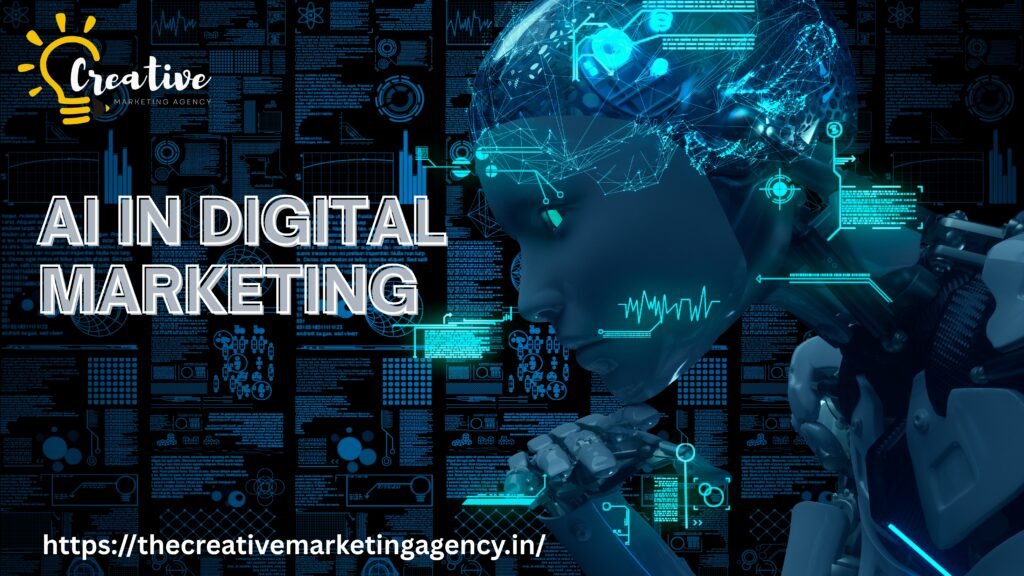In today’s fast-paced digital world, businesses are constantly looking for ways to stay ahead of the competition. One of the most powerful tools reshaping digital marketing is Artificial Intelligence (AI). By leveraging AI, marketers can create smarter ads and achieve better results through data-driven strategies, automation, and personalized user experiences.
In this blog post, we’ll explore how AI is transforming digital marketing, the benefits it offers, popular AI tools being used, and how businesses can implement AI to optimize their marketing campaigns.
What is AI in Digital Marketing?
AI in digital marketing refers to the use of artificial intelligence technologies like machine learning, natural language processing, and data analytics to improve marketing efforts. These technologies help automate tasks, analyze large volumes of data, and deliver personalized experiences to customers.
AI is used across various digital marketing channels including search engine optimization (SEO), pay-per-click (PPC) advertising, email marketing, content marketing, and social media.
Key Benefits of AI in Digital Marketing
1. Improved Customer Targeting
AI analyzes customer behavior, preferences, and demographics to help marketers identify and target the right audience. This leads to more relevant ad placements and higher conversion rates.
2. Personalized Content and Recommendations
AI enables brands to deliver personalized content to users based on their past behavior, interests, and interactions. This enhances the customer experience and increases engagement.
3. Automated Marketing Processes
AI-powered tools can automate repetitive tasks such as email responses, content creation, and campaign management. This saves time and allows marketers to focus on strategic planning.
4. Predictive Analytics
By analyzing historical data, AI can predict future trends and customer behavior. This allows marketers to make informed decisions and create proactive strategies.
5. Real-Time Customer Support
AI chatbots provide 24/7 support, answering customer queries instantly and improving overall satisfaction.
6. Enhanced ROI Tracking and Optimization
AI tools track campaign performance in real-time and suggest improvements. This ensures maximum return on investment (ROI) for every dollar spent.
How AI is Used in Different Areas of Digital Marketing
Search Engine Optimization (SEO)
AI tools like Surfer SEO and Clearscope help optimize content for better search engine rankings. They analyze keyword usage, content relevance, and competitor strategies.
Pay-Per-Click (PPC) Advertising
Platforms like Google Ads use AI to automate bidding strategies, identify high-performing ads, and suggest improvements. AI also helps in creating more effective ad copies.
Content Creation
AI writing tools such as ChatGPT, Jasper, and Copy.ai generate blog posts, product descriptions, and social media content quickly and efficiently.
Email Marketing
AI tools personalize email content, optimize send times, and segment email lists based on user behavior. This leads to higher open and click-through rates.
Social Media Marketing
AI tools analyze engagement metrics, schedule posts, and suggest the best times to publish content. Platforms like Buffer and Hootsuite integrate AI for smarter scheduling.
Customer Relationship Management (CRM)
AI-integrated CRMs analyze customer data, predict buying behavior, and recommend sales strategies. Salesforce and HubSpot are leading examples.
Popular AI Tools for Digital Marketing
- ChatGPT – Generates engaging content, answers customer queries, and assists in campaign planning.
- Jasper.ai – AI writing assistant for blogs, ads, and emails.
- HubSpot – Offers AI-powered CRM and marketing automation.
- Google Ads Smart Bidding – Uses machine learning for better ad performance.
- Surfer SEO – Helps optimize content for search engines.
- Phrasee – Optimizes email subject lines and content using AI.
- Drift – AI chatbot for lead generation and customer service.
Steps to Implement AI in Your Digital Marketing Strategy
1. Define Your Goals
Understand what you want to achieve—better ad targeting, higher conversions, improved customer service, etc.
2. Collect and Analyze Data
AI needs data to function effectively. Gather data from your website, social media, CRM, and email marketing tools.
3. Choose the Right Tools
Select AI tools that align with your business needs and marketing goals.
4. Start Small
Begin with a small campaign or a single marketing channel to test the effectiveness of AI.
5. Monitor and Optimize
Use AI to track performance metrics and continuously improve your campaigns.
6. Train Your Team
Ensure your marketing team understands how to use AI tools effectively.
Future of AI in Digital Marketing
The future of AI in digital marketing is promising. As AI technology continues to evolve, we can expect:
- More accurate customer insights
- Smarter automation
- Hyper-personalized marketing experiences
- Improved content quality and speed
- Voice and visual search optimization
AI will continue to play a critical role in helping businesses deliver better results while reducing costs and improving efficiency.
Frequently Asked Questions (FAQs)
1. What is AI in digital marketing?
AI in digital marketing involves using artificial intelligence technologies to analyze data, automate tasks, and enhance marketing strategies.
2. How can AI improve digital marketing campaigns?
AI improves targeting, personalizes content, automates workflows, and provides real-time insights to optimize campaigns.
3. Is AI suitable for small businesses?
Yes, many affordable AI tools are available that can help small businesses improve their marketing efficiency and ROI.
4. Are AI tools difficult to use?
Most AI tools are designed with user-friendly interfaces and offer tutorials or support, making them accessible to marketers with varying skill levels.
5. Will AI replace human marketers?
AI is meant to assist, not replace, human marketers. It handles repetitive tasks and data analysis, while humans focus on strategy and creativity.
Conclusion
AI is revolutionizing digital marketing by enabling smarter ad strategies and delivering better results. Whether it’s personalizing content, automating processes, or optimizing campaigns, AI offers a range of benefits for businesses of all sizes. By embracing AI and integrating it into your marketing strategy, you can stay ahead of the competition and achieve your business goals more efficiently.
Start exploring AI tools today and unlock the full potential of your digital marketing campaigns!

